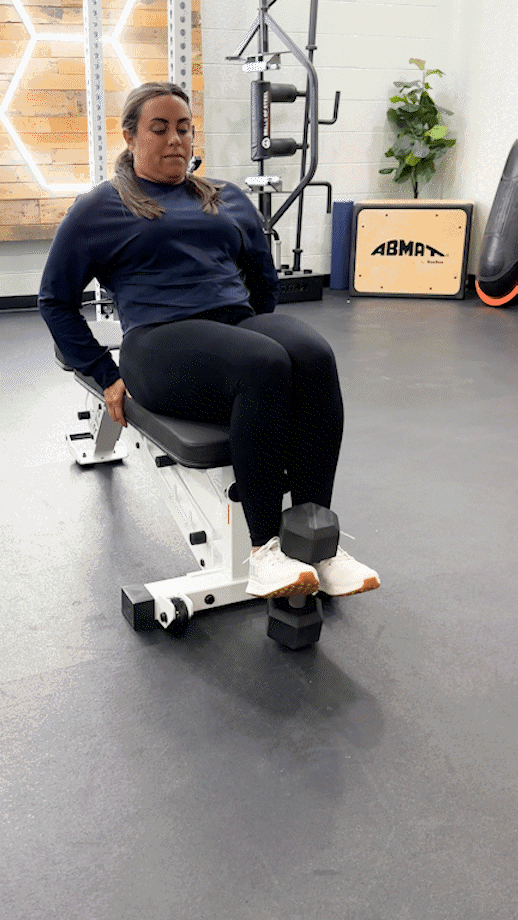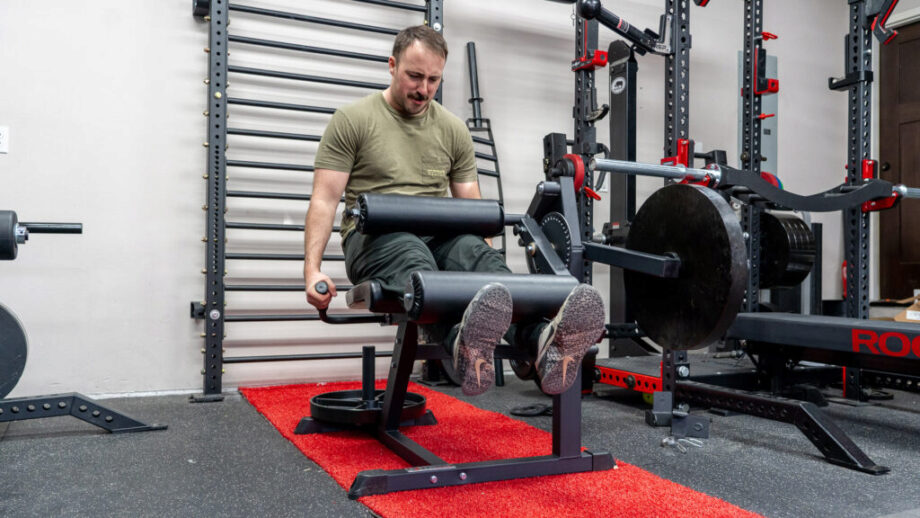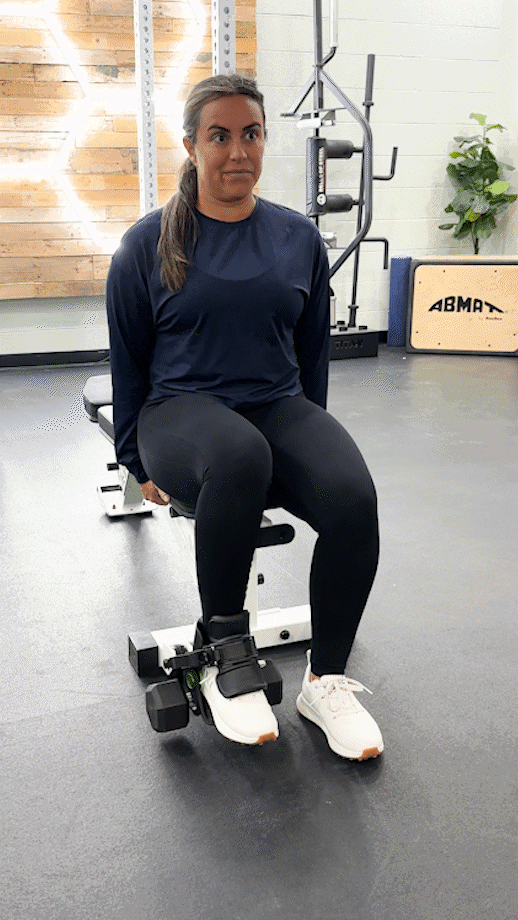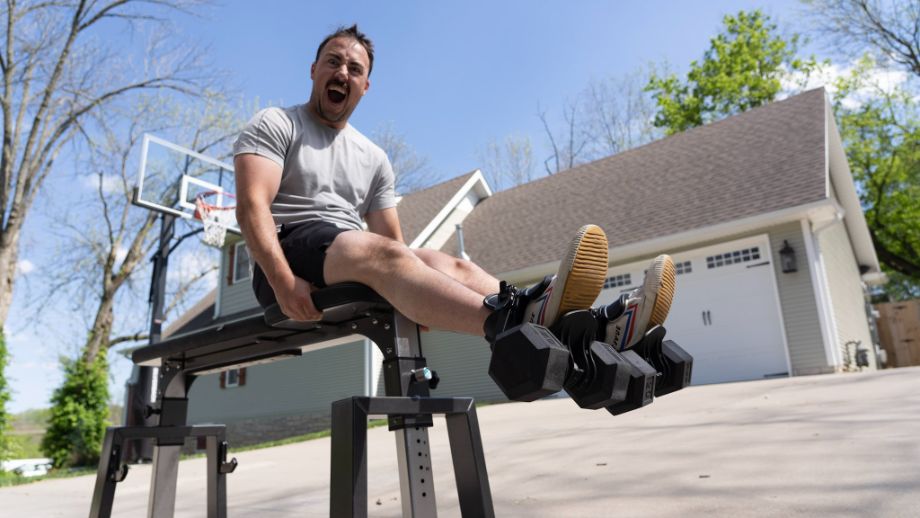We test and review fitness products based on an independent, multi-point methodology. If you use our links to purchase something, we may earn a commission. Read our disclosures.
The leg extension is one of the most popular leg exercises in the gym, and for good reason!
“As an isolation exercise, leg extensions provide superior activation in the quad muscles, including the massive rectus femoris, the functional hip flexors, and all three vastus muscles, making it an excellent finisher for an all-encompassing leg workout,” says personal trainer and GGR writer Amanda Capritto.
If you’re grinding it out at the commercial gym, we promise there will be no dearth of leg extension machines to choose from. Figuring out how to do leg extension exercise at home, on the other hand, is just a tad trickier.
How do we work in sets of leg extensions without a big, bulky machine hogging up space in our home gyms? The good news is that it absolutely can be done, and all you need is a dumbbell!
We’re covering how to do leg extensions at home, including trainer tips for form, common mistakes to avoid, a handful of variations to keep things fresh, and some useful accessories that make performing leg extensions at home a total delight!
How To Do Leg Extensions at Home
- Sit on a chair with your back straight, your feet flat on the floor, and your knees forming a 90-degree angle. Place a dumbbell vertically between your feet.
- Slowly straighten your legs, holding the dumbbell firmly, until your knees are fully extended.
- Hold the end position for a beat before slowly returning to the starting position.
- Repeat as needed.

Trainer Tips for Form
The leg extension is a fairly simple and straightforward exercise, but that doesn’t mean you don’t want to make sure your form is pristine.
Here are some tips from a personal trainer on how to nail it.
Start Light
Even if you’re big into bodybuilding and you’ve been banging out seated leg extensions on the reg, you don’t want to grab the biggest, heaviest dumbbell out of the gate and underestimate this at-home variation of the popular exercise.
“Start light and focus on your form first,” Amanda says. “Make sure you’re moving through the full range of motion with precision, keeping your back straight and core engaged.”
As you get more comfortable completing leg extensions in this fashion, scale accordingly. If you feel any pain or discomfort in your knees or joints at any time, stop immediately and consult with a medical professional. Muscle soreness is natural, but joint pain is never okay.
Control the Movement
You can cycle reps easily by kicking out the legs, letting them fall back down to the starting position, and bouncing right back up. This isn’t a good idea on a leg extension machine, and it’s doubly foolish when you’re trying to hold a dumbbell between your feet.
I mean, could you imagine if the dumbbell slipped out? Run for cover!
“Focus on using your quadriceps muscles to lift the weight,” Amanda advises. Keep the movements slow and controlled both during the initial phase and the lowering phase of the exercise. It’s not only safer, both for your body and your personal property, but it provides more time under tension to your muscles, making it overall more effective.
Remember to Breathe
Seasoned fitness pros are methodical about when they take breaths, but beginners often forget to breathe altogether, especially when the weight becomes challenging. Holding your breath is not recommended during the leg extension exercise.
Instead, start with a big inhale before the rep, exhale forcefully as you extend your legs, then take in breath as you return to the starting position. Rinse, lather, and repeat this breathing cycle for all repetitions and the set should feel slightly more manageable.
Common Leg Extension Mistakes
As you gain proficiency, you’ll want to progressively increase the load. Here are some common mistakes to look out for and avoid along your journey.
Using Too Much Weight
Using an appropriate amount of weight is crucial for beginners, but it’s arguably more important to the veterans who no longer approach the exercise with trepidation. It’s easy to take things for granted and wind up doing too much too soon.
Listen to your body and check in with your form regularly. If you find other muscles coming to the rescue when your leg muscles can’t push through the range of motion on their own, it’s safe to say you went too heavy.
Start light and increase the load by smaller increments to ensure your good form is never compromised. Form comes first. Always.

Rocking Your Torso
We know your workout playlist features some killer tunes, but we’re not trying to dance through our reps. Rocking your torso or using momentum in other ways to eke out reps not only causes less activation in the target muscle groups, it also increases your risk of injury.
Take your time on each rep and control the movement. Save those sweet dance moves for the rest periods in between your sets!
Hyperextending the Knee
You’d assume you’re supposed to really straighten out those legs and knees since the exercise is called the leg extension, knee extension, and/or quad extension. Of course, you do want to straighten the legs, but you don’t want to overdo things by overly extending the knee.
Hyperextending the knee places undue stress on the joint and could increase your risk of injury. Push against the resistance to achieve that lockout position, but don’t over-exaggerate the lockout, inadvertently compromising the natural positioning of the knee.
Leg Extension Variations
Need some “fitspiration” for a few leg extension variations?
Try some of these to switch things up during your next sesh!
Ankle Weight Leg Extensions
The dumbbell leg extension is a handy workaround for folks without a leg extension machine, but some might find holding a dumbbell between their feet uncomfortable. It’s hard to get in a good set when you’re holding onto the dumbbell for dear life!
Ankle weights are a great alternative to dumbbells for this exercise. Simply select the desired weight, slap it onto one or both ankles, and get in those reps.
Resistance Band Leg Extensions
Resistance bands also provide an alternate way of getting in a set of leg extensions. You will want to anchor the band to a sturdy point beneath you, then secure the other end around one or both of your feet either by wrapping it or using an ankle cuff.
Single-Leg Extensions
Instead of completing your set of leg extensions bilaterally, you may consider doing your left and right legs unilaterally to fully isolate, correct imbalances, and really get a great burn.
You will need an ankle weight or resistance band to do a single leg extension, as the movement is impossible to do with a dumbbell unless you’re using MonkeyFeet by Animal House Fitness.
MonkeyFeet are an excellent addition to any home gym set up. They’re portable, easy to use, and let you get in a set of leg extensions with no fear of dropping the weight.
Your concentration should be on the exercise, not on holding a dumbbell. Do yourself a favor and grab one today. Leg day will never be the same again once you try MonkeyFeet!

Useful Leg Extension Equipment Accessories
You don’t need a lot of stuff to do leg extensions at home, but you’ll need one of the below accessories at the very least.
Dumbbells
Free weights like dumbbells, barbells, and kettlebells are often the cornerstone of any comprehensive strength training regimen. For at-home leg extensions, the dumbbell reigns supreme, as it’s the easiest one to hold with your feet and get in a set.
Plus, they’re super useful in a million other ways, making them an easy item to include in your home gym. We highly recommend grabbing a great set of dumbbells if you haven’t already.
RELATED: Buying Dumbbells: How To Get The Most For Your Money
Resistance Bands
Like dumbbells, resistance bands provide endless versatility and allow you to perform the leg extension at home. Unlike dumbbells, resistance bands are light, portable, and easy to store. You’ll find advocates on both sides of the free weights vs. resistance band debate, but we here at Garage Gym Reviews recognize the benefits of both.
Ankle Weights
Holding a dumbbell between your feet is a chore. Worse yet, holding a dumbbell between your feet might take concentration away from the exercise itself, leaving you in a position where you may overlook a mistake with your form.
Ankle weights alleviate this worry by safely securing the weight to your ankle so it is not at risk of slipping mid-movement. Better yet, MonkeyFeet lets you use the dumbbell, securing it tight and keeping it firmly in place.
Both ankle weights and MonkeyFeet make viable alternatives to the regular dumbbell leg extension.
FAQs: How to Do Leg Extensions at Home
How can I do leg extensions at home without a machine?
No machine? No problem! You can do leg extensions at home with a dumbbell, ankle weight, or resistance band:
Sit on a chair with your back straight, your feet flat on the floor, and your knees forming a 90-degree angle. Place a dumbbell vertically between your feet.
Slowly straighten your legs, holding the dumbbell firmly, until your knees are fully extended.
Hold the end position for a beat before slowly returning to the starting position.
Repeat as needed.
What is a good substitute for leg extensions?
The best leg extension alternatives target the same muscle groups, as well as adjacent muscles like the glutes and hamstrings. They help you break through plateaus and stave off boredom when your routine gets a little too monotonous.
Alternative exercises include:
Squats: Squats are ostensibly the best leg exercise out there. Both bodyweight squats and squats using free weights are excellent to include in your regimen.
Lunges: Lunges are a great exercise for targeting your quadriceps, glutes, and hamstrings. They too may be performed with or without weights.
Step-ups: Step-ups are a simple yet effective way to hit your quadriceps and glutes using minimal equipment. Try using a step, bench, or sturdy chair for step-ups at home.
Bulgarian split squats: This exercise sounds super fancy, but it’s not too tough. Similar to a lunge, it targets your quadriceps, glutes, and hamstrings using minimal equipment.
Leg curls and presses: At the gym, a circuit including the leg extension, leg curl, and leg press provides a comprehensive workout on leg day. However, these alternatives are not suited for your home workouts unless you want to splurge on some pricey machines.
RELATED: 10 Leg Extension Alternatives That Will Crush Your Quads
Do leg extensions damage your knees?
Some fitness enthusiasts believe that leg extensions are bad for you because of the shear force they place on the knee joint, which they allege increases your risk of knee pain, injury, and damage over time.
A 2017 article published by the National Strength and Conditioning Association in Personal Trainers Quarterly1 delved into this controversy and essentially debunked the myth–
“Thus, one can see that the tensile forces experienced by the ACL during the knee extension…are less than one-fifth of its ultimate strength. Moreover, ACL forces during the knee extension are less than or equal to many other ‘functional’ tasks, such as walking or landing. Therefore, knee extensions do not appear to be any more unsafe for the ACL than tasks like walking.”
In fact, studies prove the opposite. A 2019 double-blind randomized trial published by the British Journal of Sports Medicine2 determined that low-load leg extension exercises, combined with blood flow restriction, could reduce knee pain by as much as 93%.
When used properly, leg extensions are actually quite good for your knee health. Just always be sure to discuss your concerns with a qualified health professional and make sure your form is picture perfect by working with a certified personal trainer.
Are leg extensions necessary?
Leg extensions aren’t necessarily indispensable to a comprehensive leg workout routine, but they can be quite effective. As one of the only isolation exercises that hits the quads, you’ll get superior activation in this muscle group compared to other leg exercises.
That said, compound exercises like the squat tend to be better for building overall lower body strength. Leg extensions are a great tool, but should be used in conjunction with other exercises if you plan on incorporating them into your routine.
References
1. Tumminello, N., Vigotsky, A. Are the seated leg extension, leg curl, and adduction machine exercises non-functional or risky?. Personal Training Quarterly. National Strength and Conditioning Association; 2017: (4): 4.
2. Giles L, Webster KE, McClelland J, Cook JL. Quadriceps strengthening with and without blood flow restriction in the treatment of patellofemoral pain: a double-blind randomised trial. Br J Sports Med. 2017;51(23):1688-1694. doi:10.1136/bjsports-2016-096329
Further reading

Looking for the best protein bar for bodybuilding? Our roundup will help you find the best one for you! Read more

Whether you want accountability or motivation, you’ll reap the benefits of group exercise. Read more

We can’t help but think the style of these trainers is top-notch. Read our NOBULL Rec Trainer review to see if these shoes match your gym or casual wear. Read more

Confused about the different types of protein? Level up your macronutrient knowledge by learning about each type and how to incorporate them from an RD. Read more

